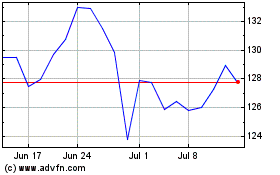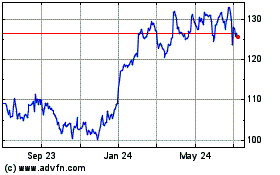Samsung Gets European Approval for Enbrel Copy
January 17 2016 - 9:30PM
Dow Jones News
SEOUL—Samsung Group said it has won approval from regulators to
sell a near-replica of the blockbuster rheumatoid arthritis drug
Enbrel in Europe, marking an early milestone for South Korea's
biggest conglomerate in the nascent market for so-called biosimilar
drugs.
The approval comes as Samsung Bioepis Co., the conglomerate's
drug development arm, is preparing a public listing on the Nasdaq
Stock Market.
Samsung's third-generation heir apparent Lee Jae-yong has looked
to the biologic drug industry as a growth engine amid slowing
profit increases at its lucrative flagship company, smartphone
maker Samsung Electronics Co.
Unlike simpler, chemically-synthesized drugs such as aspirin,
biologic drugs are made from living cells to treat a variety of
ailments ranging from cancer to arthritis. Biosimilars are
near-replicas of biologic drugs that are akin to the generic
versions of chemical drugs, offering similar treatments at lower
prices.
Samsung's efforts in the biologic industry are two-pronged. One
company, Samsung Biologics Co., is aiming to become the world's
biggest contract manufacturer of biologic drugs developed by
companies such as Bristol-Myers Squibb Co. and Roche Holding
AG.
Meanwhile, its subsidiary Samsung Bioepis, which was founded
four years ago, is developing its own biosimilars of existing drugs
whose patents have expired or will expire soon, including Pfizer
Inc.'s Enbrel and Johnson & Johnson's Remicade.
The greenlighting of the biosimilar by the European Commission,
which oversees drug approvals for the European Union, is Samsung
Bioepis's first in a major market. Samsung Bioepis has a deal with
Cambridge, Mass.-based Biogen Inc. to commercialize and distribute
the Samsung biosimilar in Europe, where it will be marketed under
the name Benepali.
Samsung Bioepis also is planning to seek regulatory approval for
the biosimilar from the U.S. Food and Drug Administration. The
biosimilar won approval from South Korean regulators and went on
sale last year in partnership with MSD Korea Ltd., a subsidiary of
Merck & Co., where it is sold as Brenzys.
Biosimilars are still a burgeoning field, with regulators moving
more cautiously than some analysts had expected in approving them,
particularly in the U.S.
In addition to the Enbrel biosimilar, Samsung Bioepis has five
other biosimilars in development, and the company's chief executive
officer Christopher Ko said in a statement that it would file for
regulatory approval of "a number of them" in markets around the
world in the coming months.
Just down the street from Samsung Bioepis' headquarters in
Songdo, South Korea, rival Celltrion Inc. won EMA approval in 2013
for Remsima, its near-replica of the blockbuster rheumatoid
arthritis drug Remicade. The company is seeking FDA approval for
Remsima, and submitted an application last year to the EMA for a
biosimilar of Roche's cancer treatment Rituxan.
Write to Jonathan Cheng at jonathan.cheng@wsj.com
Corrections & Amplifications: Samsung Bioepis' biosimilar
was approved by the European Commission. An earlier version of this
article incorrectly stated it was approved by the European
Medicines Agency. (Jan. 17)
(END) Dow Jones Newswires
January 17, 2016 21:15 ET (02:15 GMT)
Copyright (c) 2016 Dow Jones & Company, Inc.
Merck (NYSE:MRK)
Historical Stock Chart
From Mar 2024 to Apr 2024

Merck (NYSE:MRK)
Historical Stock Chart
From Apr 2023 to Apr 2024
